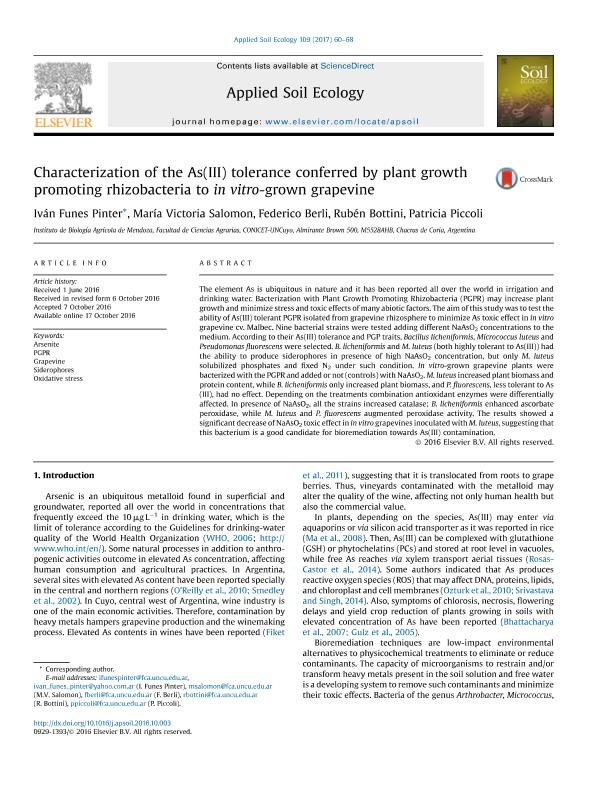Mostrar el registro sencillo del ítem
dc.contributor.author
Funes Pinter, Mariano Iván

dc.contributor.author
Salomon, María Victoria

dc.contributor.author
Berli, Federico Javier

dc.contributor.author
Bottini, Ambrosio Rubén

dc.contributor.author
Piccoli, Patricia Noemí

dc.date.available
2018-03-26T20:06:05Z
dc.date.issued
2017-01
dc.identifier.citation
Funes Pinter, Mariano Iván; Salomon, María Victoria; Berli, Federico Javier; Bottini, Ambrosio Rubén; Piccoli, Patricia Noemí; Characterization of the As(III) tolerance conferred by plant growth promoting rhizobacteria to in vitro-grown grapevine; Elsevier Science; Applied Soil Ecology; 109; 1-2017; 60-68
dc.identifier.issn
0929-1393
dc.identifier.uri
http://hdl.handle.net/11336/40007
dc.description.abstract
The element As is ubiquitous in nature and it has been reported all over the world in irrigation and drinking water. Bacterization with Plant Growth Promoting Rhizobacteria (PGPR) may increase plant growth and minimize stress and toxic effects of many abiotic factors. The aim of this study was to test the ability of As(III) tolerant PGPR isolated from grapevine rhizosphere to minimize As toxic effect in in vitro grapevine cv. Malbec. Nine bacterial strains were tested adding different NaAsO2 concentrations to the medium. According to their As(III) tolerance and PGP traits, Bacillus licheniformis, Micrococcus luteus and Pseudomonas fluorescens were selected. B. licheniformis and M. luteus (both highly tolerant to As(III)) had the ability to produce siderophores in presence of high NaAsO2 concentration, but only M. luteus solubilized phosphates and fixed N2 under such condition. In vitro-grown grapevine plants were bacterized with the PGPR and added or not (controls) with NaAsO2. M. luteus increased plant biomass and protein content, while B. licheniformis only increased plant biomass, and P. fluorescens, less tolerant to As(III), had no effect. Depending on the treatments combination antioxidant enzymes were differentially affected. In presence of NaAsO2, all the strains increased catalase; B. licheniformis enhanced ascorbate peroxidase, while M. luteus and P. fluorescens augmented peroxidase activity. The results showed a significant decrease of NaAsO2 toxic effect in in vitro grapevines inoculated with M. luteus, suggesting that this bacterium is a good candidate for bioremediation towards As(III) contamination.
dc.format
application/pdf
dc.language.iso
eng
dc.publisher
Elsevier Science

dc.rights
info:eu-repo/semantics/openAccess
dc.rights.uri
https://creativecommons.org/licenses/by-nc-sa/2.5/ar/
dc.subject
Arsenite
dc.subject
Grapevine
dc.subject
Oxidative Stress
dc.subject
Pgpr
dc.subject
Siderophores
dc.subject.classification
Otras Ciencias Biológicas

dc.subject.classification
Ciencias Biológicas

dc.subject.classification
CIENCIAS NATURALES Y EXACTAS

dc.title
Characterization of the As(III) tolerance conferred by plant growth promoting rhizobacteria to in vitro-grown grapevine
dc.type
info:eu-repo/semantics/article
dc.type
info:ar-repo/semantics/artículo
dc.type
info:eu-repo/semantics/publishedVersion
dc.date.updated
2018-03-23T18:19:22Z
dc.journal.volume
109
dc.journal.pagination
60-68
dc.journal.pais
Países Bajos

dc.journal.ciudad
Amsterdam
dc.description.fil
Fil: Funes Pinter, Mariano Iván. Consejo Nacional de Investigaciones Científicas y Técnicas. Centro Científico Tecnológico Conicet - Mendoza. Instituto de Biología Agrícola de Mendoza. Universidad Nacional de Cuyo. Facultad de Ciencias Agrarias. Instituto de Biología Agrícola de Mendoza; Argentina
dc.description.fil
Fil: Salomon, María Victoria. Consejo Nacional de Investigaciones Científicas y Técnicas. Centro Científico Tecnológico Conicet - Mendoza. Instituto de Biología Agrícola de Mendoza. Universidad Nacional de Cuyo. Facultad de Ciencias Agrarias. Instituto de Biología Agrícola de Mendoza; Argentina
dc.description.fil
Fil: Berli, Federico Javier. Consejo Nacional de Investigaciones Científicas y Técnicas. Centro Científico Tecnológico Conicet - Mendoza. Instituto de Biología Agrícola de Mendoza. Universidad Nacional de Cuyo. Facultad de Ciencias Agrarias. Instituto de Biología Agrícola de Mendoza; Argentina
dc.description.fil
Fil: Bottini, Ambrosio Rubén. Consejo Nacional de Investigaciones Científicas y Técnicas. Centro Científico Tecnológico Conicet - Mendoza. Instituto de Biología Agrícola de Mendoza. Universidad Nacional de Cuyo. Facultad de Ciencias Agrarias. Instituto de Biología Agrícola de Mendoza; Argentina
dc.description.fil
Fil: Piccoli, Patricia Noemí. Consejo Nacional de Investigaciones Científicas y Técnicas. Centro Científico Tecnológico Conicet - Mendoza. Instituto de Biología Agrícola de Mendoza. Universidad Nacional de Cuyo. Facultad de Ciencias Agrarias. Instituto de Biología Agrícola de Mendoza; Argentina
dc.journal.title
Applied Soil Ecology

dc.relation.alternativeid
info:eu-repo/semantics/altIdentifier/doi/http://dx.doi.org/10.1016/j.apsoil.2016.10.003
dc.relation.alternativeid
info:eu-repo/semantics/altIdentifier/url/https://www.sciencedirect.com/science/article/pii/S0929139316304322
Archivos asociados
